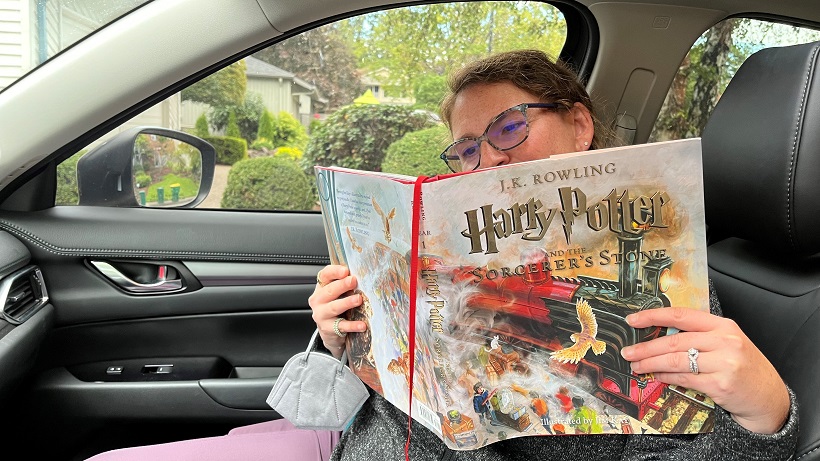As you may know, I loved the Harry Potter series. I read it as an adult, mostly because Shiri wanted to read it, and I wanted to know what we were getting ourselves into. Shiri quickly became obsessed, so I dove headlong into the series in order to have a background on all the things she was starting to talk about, including what she learned from friends who were already enthralled with the books. While Shiri was falling in love with the series, Harry Potter’s author J.K. Rowling was in the news, not because of a new novel or movie, but because of statements she made about certain views she held. These views were not only in opposition to those that our family holds dear, but the statements were directly hurtful and harmful to many people.

This is when Duncan and I, as a parenting team, had a decision to make. Shiri really wanted us to purchase ALL THE HARRY POTTER THINGS, and we didn’t really feel like we could spend our money adding to the wealth of someone who didn’t represent our values. Should we just say no to everything, or was there a middle ground? Could we purchase the books, but not the LEGO sets and outfits? And then how would we explain it to Shiri? If you’ve ever spent time with a seven-year-old, you probably know there would be a lot of explaining to do. As parents, and as humans, part of our decision was based on how to explain the complexities of this to our very aware young daughter.
As tricky as it may have felt to us, this example is certainly easier than what Moshe has to deal with in this week’s Torah portion as he reconciles the fact that he is nearing the end of his life. Our Torah portion this week, Parshat Vayelech, recounts a way in which God plays hide and seek with us. Parshat Vayelech speaks of the difficulty leaders have in transferring over their power. We read of the final days of Moshe and the gift of life he had in living 120 years. The Israelites approach the land promised to them and witness the transfer of “power” to Joshua. Finally, Moshe writes the words of the Torah and passes down the commandment to the Kohanim to read the Torah. Moshe’s final moments with the Israelites are near, and he prepares by coming up with a transfer of legacy, tradition, and history.
Moshe finds himself in a liminal moment; he knows the Israelite nation is nearing the Land of Israel, and he knows he won’t be allowed in, thus he knows his time is coming to an end. Until this point, he hasn’t fully accepted this as reality. It’s only after God, in chapter 31, verse 14, reminds Moshe directly, “The time is drawing near for you to die” that Moshe is willing to accept this reality and begin to share his final wishes for the people and his final leadership moments.
When it came to our decision about Harry Potter, we decided not to quash or discourage Shiri’s love of the books. Reading them out loud with her has made her love reading, even before she had the confidence to read on her own. But we did have a meaningful conversation about how the author’s personal views are different from ours. We wanted to model what it looks like to accept reality and deal with it on reality’s terms.
Early on, when Moshe refuses to acknowledge that he won’t live forever, he interferes with the new leadership and actually starts to hold the new nation back. While I didn’t want to have to explain to my seven-year-old why J.K. Rowling could be a great writer and also could say things we disagree with, it was incredibly important to have that conversation on her level to show her how to act when you’re conflicted. Parshat Vayelech teaches us that some situations have no easy answers. But when we decide to accept reality and allow ourselves to be vulnerable to a little discomfort, sometimes that’s when we help our society and ourselves to move forward.



